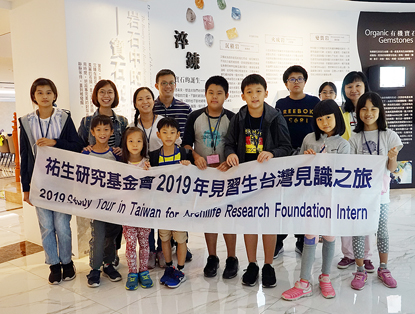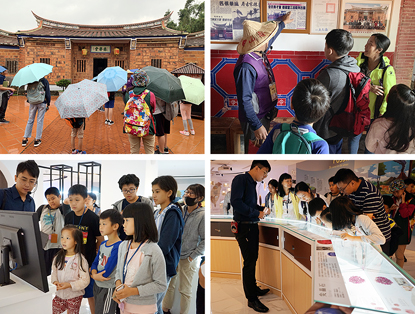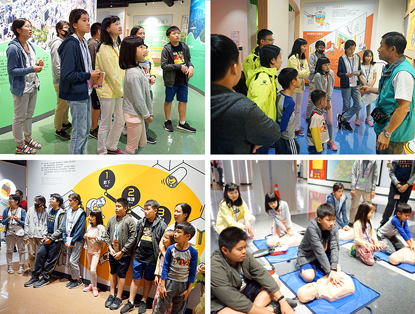Sketch of Archilife Study Tour, September 2019Date: 2019-10-21
Section: Activity |  9月份見識之旅活動,於2019年9月21日由呂明澐小姐帶領12位祐生見習生及其家長們,進行桃園侏儸紀寶石教室暨防災教育體驗之旅。活動開始之初,領隊呂明澐小姐提醒本次活動注意事項及觀察重點,先行建立見習生的背景知識。 9月份見識之旅活動,於2019年9月21日由呂明澐小姐帶領12位祐生見習生及其家長們,進行桃園侏儸紀寶石教室暨防災教育體驗之旅。活動開始之初,領隊呂明澐小姐提醒本次活動注意事項及觀察重點,先行建立見習生的背景知識。
For the study tour of September 21, 2019, Ms. Lu Ming-yun led 12 ARF interns and their parents to Taoyuan to learn about gemstones and disaster prevention. At the start of the day's activities, team leader Ms. Lu Ming-yun reminded everyone about things to note and what to observe, and gave the interns some background knowledge.
 本次行程上午至德馨堂參訪,由當地發展協會志工擔任導覽老師。活動一開始即介紹該建築座東向西,風水上有聚財之意,俚語稱「座東向西,賺錢無人知」。隨後說明德馨堂為燕尾式閩南傳統民居,在古代認為鳥是通天靈物,能敬天通神,故燕尾翹脊多見於廟宇或官宅,由此可知其祖先當時有官職在身。緊接著前往侏儸紀博物館。導覽人員首先解說寶石生成的環境要件及各式寶石的特徵和產地,其中紅色尖晶石與紅剛玉外觀相似,過去常被誤認,英國皇家王冠上的黑王子紅寶石後被證實為紅色尖晶石即案例之一。接著觀賞寶石開採紀錄片,內容記述寶石礦坑的真實樣貌。礦工須下爬約台北101大樓高的距離至地底採礦,礦坑內部粉塵飛揚、工作環境惡劣,炸礦脈也易發生坍塌,故駐紮地底的礦工平均壽命不超過35歲,值得我們反思貧富差距的問題。影片播畢後,導覽人員教導簡易的琥珀鑑定方法—將琥珀放進飽和鹽水中,因其相對密度較小,會懸浮於飽和鹽水中。 本次行程上午至德馨堂參訪,由當地發展協會志工擔任導覽老師。活動一開始即介紹該建築座東向西,風水上有聚財之意,俚語稱「座東向西,賺錢無人知」。隨後說明德馨堂為燕尾式閩南傳統民居,在古代認為鳥是通天靈物,能敬天通神,故燕尾翹脊多見於廟宇或官宅,由此可知其祖先當時有官職在身。緊接著前往侏儸紀博物館。導覽人員首先解說寶石生成的環境要件及各式寶石的特徵和產地,其中紅色尖晶石與紅剛玉外觀相似,過去常被誤認,英國皇家王冠上的黑王子紅寶石後被證實為紅色尖晶石即案例之一。接著觀賞寶石開採紀錄片,內容記述寶石礦坑的真實樣貌。礦工須下爬約台北101大樓高的距離至地底採礦,礦坑內部粉塵飛揚、工作環境惡劣,炸礦脈也易發生坍塌,故駐紮地底的礦工平均壽命不超過35歲,值得我們反思貧富差距的問題。影片播畢後,導覽人員教導簡易的琥珀鑑定方法—將琥珀放進飽和鹽水中,因其相對密度較小,會懸浮於飽和鹽水中。
The day's itineraries began with a visit to Te-Hsin Hall in the morning. Guided by the local development association's volunteer, the tour began with an introduction of the building's geographical position. Seated in the east and facing west, the building's position is designed according to Fengshui principle to gather wealth. In ancient times, birds were thought to be creatures of the spiritual realm and could communicate with gods. Thus, swallow-tail ridge were often seen in the architectural designs of temples and residences of government officials. As the traditional Minnan-style house features a swallow-tail ridge, it is evident that the owner's ancestor was once a government official. Next destination on the itineraries was Jurassic Museum. The tour guide began by explaining environmental conditions required for the formation of gems, and the characteristics and places of origin of different types of gemstones. Red spinel and red corundum are similar in appearance and are often mistaken. For instance, the Black Prince's ruby on the state crown of England was later proven to be a red spinel. Everyone then watched a documentary on gemstone mining, which showed miners having to go down the mine which was as deep as the height of Taipei 101. The inside of the mines are dusty and work environment is harsh, and tunnels can collapse easily during explosions. Thus, miners working underground often do not live past 35 years old, giving cause for us to reflect on the issue of the divide between the rich and the poor. After watching the documentary, the tour guide taught everyone an easy method to identify real amber – genuine amber will float in a saturated saline solution because of its relatively low density.
 中午飯後,前往桃園防災教育館。導覽人員藉由互動式模型解釋颱風、地震及土石流等天災發生的成因。其中特別說明地震發生時,人們會因地震波的傳播感受到搖晃,地震波主要有破壞力較小的P波與破壞力較大的S波,目前地震警報即透過最先抵達的P波預估S波之振動大小,並在S波抵達前發出警報,爭取數秒的預警時間。隨後至火災防治區,火災發生原因可分為四類,不同類型的火災須採取不同滅火方式,避免造成更大的危害,眾人亦於濃煙密布的房間演練火災發生時如何逃生。參訪當天為921大地震20周年,導覽人員特別提醒地震避難時應記住「趴下」、「掩護」、「穩住」三大步驟,找到適當躲避地點後應以雙手護住頭及頸椎趴跪於地面,隨即於地震體驗平台實地練習,以備往後地震避難時之需。至此,本日活動已近尾聲,大家一起合照留念後搭車返程,並期待於下次見識之旅再相見。 中午飯後,前往桃園防災教育館。導覽人員藉由互動式模型解釋颱風、地震及土石流等天災發生的成因。其中特別說明地震發生時,人們會因地震波的傳播感受到搖晃,地震波主要有破壞力較小的P波與破壞力較大的S波,目前地震警報即透過最先抵達的P波預估S波之振動大小,並在S波抵達前發出警報,爭取數秒的預警時間。隨後至火災防治區,火災發生原因可分為四類,不同類型的火災須採取不同滅火方式,避免造成更大的危害,眾人亦於濃煙密布的房間演練火災發生時如何逃生。參訪當天為921大地震20周年,導覽人員特別提醒地震避難時應記住「趴下」、「掩護」、「穩住」三大步驟,找到適當躲避地點後應以雙手護住頭及頸椎趴跪於地面,隨即於地震體驗平台實地練習,以備往後地震避難時之需。至此,本日活動已近尾聲,大家一起合照留念後搭車返程,並期待於下次見識之旅再相見。
After lunch, everyone headed to Taoyuan Disaster Education Center. Using interactive models, the tour guide explained the reasons natural disasters, such as typhoon, earthquake and mudslide, occur. According to the tour guide, the transmission of seismic waves causes us to feel vibration when earthquake occurs. There are mainly two types of seismic waves, the less destructive P wave and more destructive S wave. Today's earthquake early warning system uses the initial P wave to predict the vibration of the oncoming S wave and sends out alert before the S wave arrives, providing critical seconds of notice. In the fire prevention zone of the center, everyone learned that there are four types of fire which must be extinguished differently to avoid causing greater danger. Everyone also participated in an evacuation drill in a smoky room. As the day of the visit marked the 20th anniversary of the 921 earthquake, the tour guide reminded everyone to remember the three steps to take during an earthquake, i.e. drop, cover and hold on. After finding a suitable shelter, one should cover one's head and neck with both arms. Everyone also practiced the three steps on an earthquake experience platform, which could become handy in the event of an actual earthquake. At this point, the day's itinerary came to an end. Everyone took a group photo before heading back and looked forward to the next study tour.
|
|